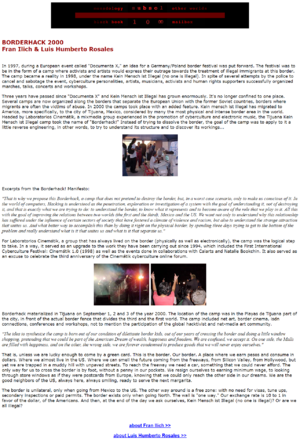2000 – Borderhack Manifesto – Fran Ilich & Luis Humberto Rosales

Texto
Fragmentos del manifiesto
"That is why we propose this Borderhack, a camp that does not pretend to destroy the border, but, in a worst case scenario, only to make us conscious of it. In the world of computers, Hacking is understood as the penetration, exploration or investigation of a system with the goal of understanding it, not of destroying it, and that is exactly what we are trying to do: to understand the border, to know what it represents and to become aware of the role that we play in it. All this with the goal of improving the relations between two worlds (the first and the third), Mexico and the US. We want not only to understand why this relationship has suffered under the influence of certain sectors of society that have fostered a climate of violence and racism, but also to understand the strange attraction that unites us. And what better way to accomplish this than by doing it right on the physical border, by spending three days trying to get to the bottom of the problem and really understand what is it that unites us and what is it that separate us."
"The idea to synthesize the camp is born out of our condition of dilettante border kids, out of our years of crossing the border and doing a little window shopping, pretending that we could be part of the American Dream of wealth, happiness and freedom. We are confused, we accept it. On one side, the Malls are filled with happiness, and on the other, the wrong side, we are forever condemned to produce goods that we will never enjoy ourselves."
Contexto
El manifiesto, del que solamente se han encontrado algunos fragmentos, fue presentado en la localidad de Playas de Tijuana perteneciente al municipio de Tijuana en el año 2000 durante el festival Borderhack que se llevó a cabo del 1 al 3 de septiembre (1). El evento tuvo lugar frente a una de las cercas fronterizas que dividen México de los Estados Unidos y contó con exhibiciones de net art, proyecciones cinematográficas, conferencias y talleres (1).
Borderhack fue una extensión del movimiento Kein Mensch ist Illegal que al español podría traducirse como “nadie es ilegal” (2). Kein Mensch ist Illegal se llevó a cabo por primera vez en el año de 1998 en Europa con la finalidad de discutir y expresar opiniones sobre al trato dado a los migrantes de las fronteras entre de la Unión Europea y los países que integraban la Unión Soviética (1). Los encuentros celebrados en Tijuana estuvieron dirigidos por Laboratorios Cinematik, un grupo de medios mixtos con experiencia en la promoción de la cibercultura y la música electrónica, además tuvieron por objetivo comprender la estructura y el funcionamiento de la frontera entre México y Estados Unidos (1).
Se anuncia en Nettime donde también aparecen fragmentos del manifiesto https://www.nettime.org/Lists-Archives/nettime-l-0009/msg00075.html http://web.archive.org/web/20210422032810/http://www.nettime.org/Lists-Archives/nettime-l-0009/msg00075.html
y además un enlace al sitio del evento https://web.archive.org/web/20010125035900/http://www.neuroticos.com/borderhack/eng.html
Aparece en:
https://www.digitalmanifesto.net/manifestos/191/
http://www.zdtv.com/zdtv/cybercrime/hackingandsecurity/story/0,9955,10407,00
https://www.nettime.org/Lists-Archives/nettime-l-0009/msg00075.html
Autoras
Fran Ilich es un escritor y artista multimedia nacido en Tijuana en el año de 1975 (3). Algunos de los temas recurrentes dentro de su práctica artística son el hacktivismo, la banca de inversión y los medios narrativos, además es autor de las novelas Metro Pop (1997), Tekno Guerrilla (2008) y Circa 94 (2010) (3). Ilich también ha presentado su trabajo y participado en foros como Documenta 12, Transmediale, Berlinale Talent Campus, MIT media in Transition, Electronic Literature Organization symposium e Hybrid Storyspaces en Cornell University (3).
Al momento de escribirse el manifiesto, Luis Humberto Rosales era estudiante de medicina además de escritor y miembro fundador de Laboratorios Cinematik (1).
Fuentes
(1) http://subsol.c3.hu/subsol_2/contributors/ilichtext.html
(2) http://divus.cc/london/en/article/at-the-edge-of-impermanence
(3) http://sic.cultura.gob.mx/ficha.php?table=artista&table_id=4810
Archivo
Archivo:Ilich & Rosales, Borderhack.pdf
Enlaces
URL: http://subsol.c3.hu/subsol_2/contributors/ilichtext.html
Wayback Machine: https://web.archive.org/web/20180406145024/http://subsol.c3.hu/subsol_2/contributors/ilichtext.html